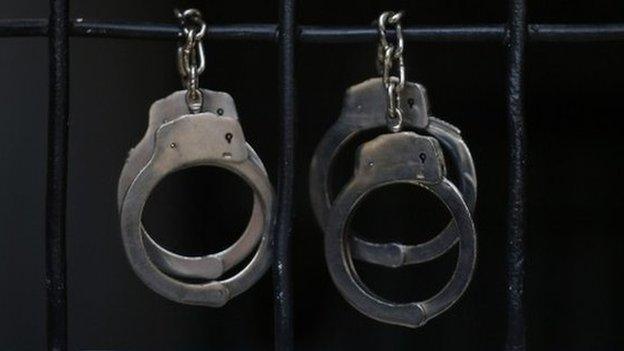EU justice measures backed by MPs despite anger over procedure
- Published
Speaker John Bercow oversaw angry scenes in the Commons, reports Ben Wright
The government has won its bid to sign up again to 35 EU justice measures - including the European Arrest Warrant - following a dramatic Commons vote.
But Labour and backbench Tory MPs accused ministers of breaking a promise for a vote on the warrant itself.
The debate ended early when Labour lost its attempt to use a rare Parliamentary procedure to postpone the decision.
Earlier, Commons Speaker John Bercow said people would be "contemptuous" of the government's tactics.
BBC political correspondent Carole Walker said there were "scenes of chaos" in the Commons chamber.
Speaker's ruling
The government opted out of all 133 EU police and criminal justice measures measures in 2013, external, a decision that will take effect on 1 December.
However, ministers plan to rejoin 35 of the measures, including the European Arrest Warrant, before that deadline.
Supporters, including the government and law enforcement agencies, say the warrant is a vital tool to protect the UK and bring criminals to justice across EU borders.
However, critics - including some Conservative MPs - say the European Arrest Warrant is overused and a threat to the liberties of Britons and the sovereignty of the UK.

Drama in the Commons
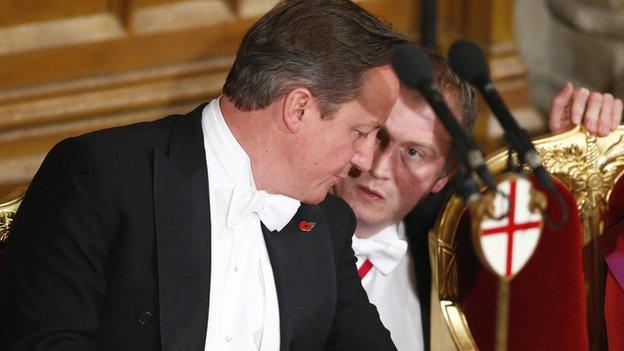
David Cameron, pictured conversing with an aide, left the Lord Mayor's Banquet to vote
Clashes start after it emerges the government's motion does not include the European Arrest Warrant
Labour's Yvette Cooper puts forward her own motion calling for a postponement of the vote
Facing potential defeat, Conservative backbenchers seek to delay the Labour motion by filibustering to allow Tory MPs to return to the Commons
PM David Cameron returns early from the Lord Mayor's Banquet to take part in the divisions dressed in a white dress tie
Chancellor George Osborne and other MPs also rush to Parliament for the vote
The Labour motion is defeated by 272 votes to 229 - a majority of 43
The government sees its original motion carried in a vote two hours ahead of schedule, by 464 to 38.

Commons clashes erupted after Mr Bercow ruled the debate and vote would not cover the arrest warrant.
Mrs May said only 11 of the EU justice measures needed to be voted on and "transposed" into UK law. But she told MPs the Commons' verdict on these measures would be treated as a vote on the whole package of 35.
The debate came to an end when shadow home secretary Yvette Cooper invoked a rare procedure to ask that the "question be not now put", asking Mrs May to come back with a motion which specifically included the warrant.
Faced with a potential backbench rebellion, Prime Minister David Cameron returned early from the Lord Mayor's Banquet dressed in a white tie, while other Tories were urgently called back to Parliament to take part in the vote.
When Mrs Cooper's motion was defeated by 272 to 229 - a majority of just 43 - the vote on the EU justice measures took place immediately, with MPs voting in favour by 464 to 38.
'Sorry saga'
The government's approach was criticised by Mr Bercow and Conservative MPs.
"There is not today to be a vote on the specific matter of membership of the European Arrest Warrant," Mr Bercow told MPs.
The Speaker said he himself had expected a vote on the warrant, saying it was a "sorry saga" and that "the House should not be put in that position".
"A commitment is a commitment to be honoured," he said, "rather than trying to slip things through some sort of artifice".
He said the public expected "straightforward dealing and they are frankly contemptuous, and I use the word advisedly, of what is not straightforward dealing".

European Arrest Warrants
The European Arrest Warrant operates EU-wide and replaced separate extradition arrangements between the EU member states
It was introduced in January 2004, and was prompted by the international anti-terror drive after the 11 September 2001 attacks on the United States
A national judicial authority, such as a court, can issue an EU warrant to get a suspect extradited
For a warrant to be valid, the suspect must be accused of an offence incurring a maximum penalty of at least a year in prison, or must have been already sentenced to at least four months in prison

Conservative MP Sir Richard Shepherd said the government's behaviour had been "sly", while fellow Tory MP Jacob Rees-Mogg called it "underhand".
Tory MP Bill Cash, who chairs the Commons European Scrutiny Committee, said: "This is a disgraceful way of going about a very, very important matter. It is tainted with chicanery, it is not the way this Parliament should be treated."
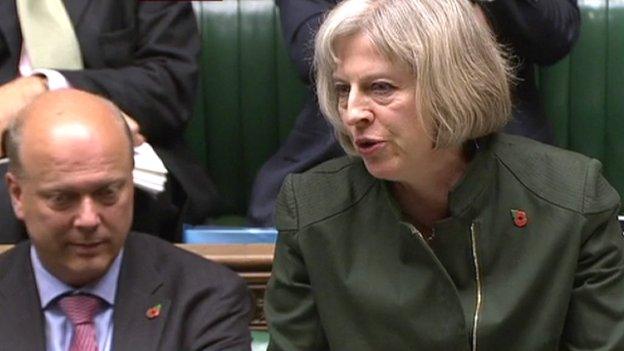
Theresa May said the government had not been required to hold a vote on the measures
Despite the speaker's ruling, Justice Secretary Chris Grayling told the Commons the vote would be on all 35 of the EU crime and justice measures.
And Mrs May said the government was not legally required to bring the measures to the House. Transposing some into UK law would usually be done through a special committee of MPs, she said.
When the main debate got under way, Mrs May said she understood concerns over the warrant but said she had legislated to make it "better and safer".
Setting out the case to retain it, she told MPs more than 95% of people extradited from the UK were foreign nationals, including suspects wanted for 124 murders, more than 100 rapes, nearly 500 serious assaults and seven terrorism cases.
The home secretary said "harmful individuals" could walk free and escape justice without the "vital" regulations, saying the process had to be completed by 1 December to avoid an "operational gap".
But Mrs Cooper, who said she supported the European Arrest Warrant, nonetheless said Mrs May had presided over a Parliamentary "shambles".
"You have effectively said ministers are just going to make it up because the Speaker has been very clear that this does not include a vote on the European Arrest Warrant, you are just going to reinterpret it in any way you choose," she said.
- Published10 November 2014
- Published10 November 2014
- Published10 November 2014
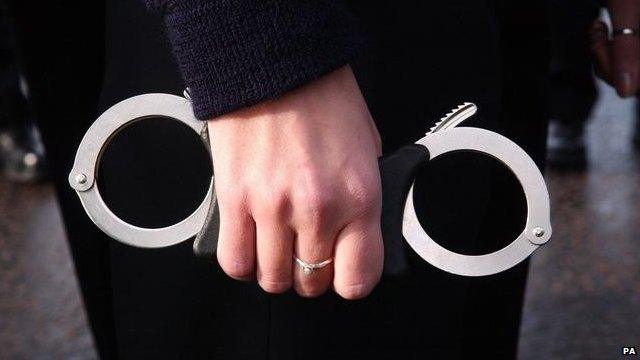
- Published5 December 2014
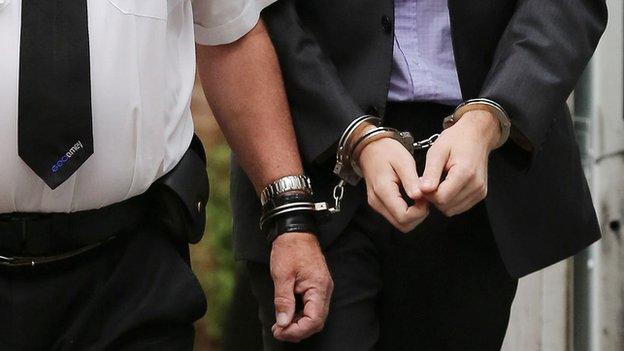
- Published10 November 2014
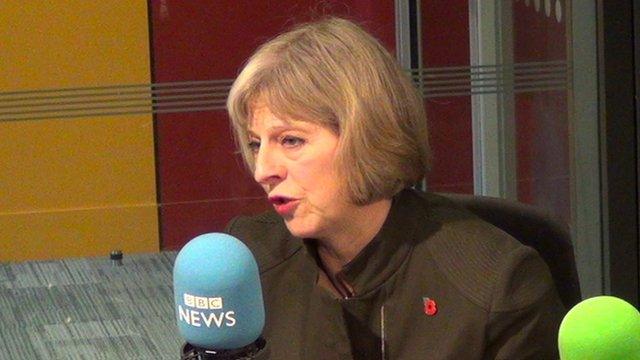
- Published10 November 2014
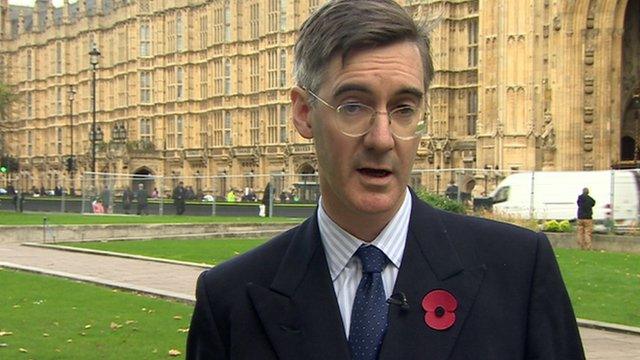
- Published9 November 2014
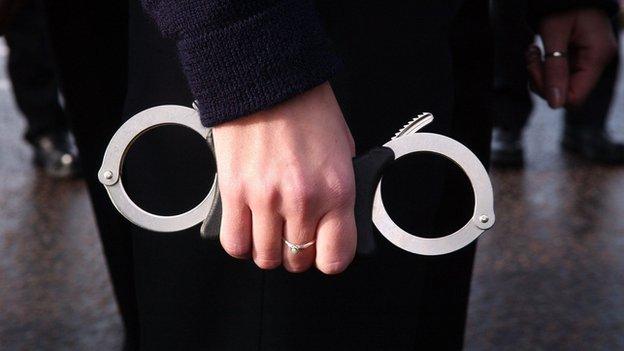
- Published6 November 2014
